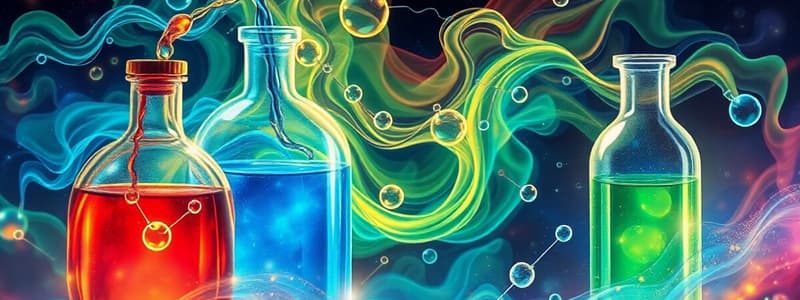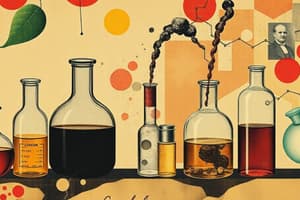Podcast
Questions and Answers
Which separation technique is most suitable for isolating salt from a salt water solution?
Which separation technique is most suitable for isolating salt from a salt water solution?
- Evaporation (correct)
- Chromatography
- Filtration
- Distillation
The empirical formula of a compound gives the actual number of atoms of each element present in a molecule.
The empirical formula of a compound gives the actual number of atoms of each element present in a molecule.
False (B)
What type of chemical bond is formed by the sharing of electrons between two non-metal atoms?
What type of chemical bond is formed by the sharing of electrons between two non-metal atoms?
covalent bond
A substance that speeds up a chemical reaction without being consumed in the reaction is called a ______.
A substance that speeds up a chemical reaction without being consumed in the reaction is called a ______.
Match the following terms with their definitions:
Match the following terms with their definitions:
Which of the following statements accurately describes the arrangement of elements in the modern periodic table?
Which of the following statements accurately describes the arrangement of elements in the modern periodic table?
Alkanes are unsaturated hydrocarbons containing at least one carbon-carbon double bond.
Alkanes are unsaturated hydrocarbons containing at least one carbon-carbon double bond.
What is the general formula for alkenes?
What is the general formula for alkenes?
The reaction between an acid and a base is called ______, which produces a salt and water.
The reaction between an acid and a base is called ______, which produces a salt and water.
According to Le Chatelier's Principle, what happens to a system at equilibrium when the concentration of a reactant is increased?
According to Le Chatelier's Principle, what happens to a system at equilibrium when the concentration of a reactant is increased?
Flashcards
What is Chemistry?
What is Chemistry?
Matter and its properties, including composition, structure, and reactions.
What is an Element?
What is an Element?
A substance that cannot be broken down into simpler substances by chemical means; consists of only one type of atom.
What is an Atom?
What is an Atom?
The smallest unit of an element that retains the chemical properties of that element.
What is an Ionic Bond?
What is an Ionic Bond?
Signup and view all the flashcards
What is Empirical Formula?
What is Empirical Formula?
Signup and view all the flashcards
What is Titration?
What is Titration?
Signup and view all the flashcards
What are Groups (Periodic Table)?
What are Groups (Periodic Table)?
Signup and view all the flashcards
What is the Reactivity Series?
What is the Reactivity Series?
Signup and view all the flashcards
What are Hydrocarbons?
What are Hydrocarbons?
Signup and view all the flashcards
What is an Exothermic Reaction?
What is an Exothermic Reaction?
Signup and view all the flashcards
Study Notes
No new information to add. The provided text is identical to the existing notes.
Studying That Suits You
Use AI to generate personalized quizzes and flashcards to suit your learning preferences.




